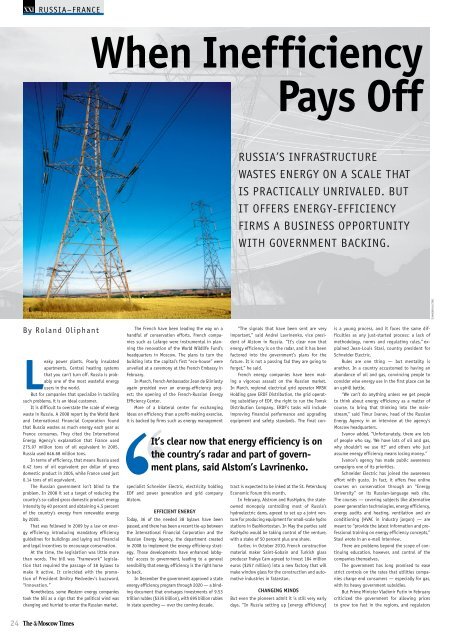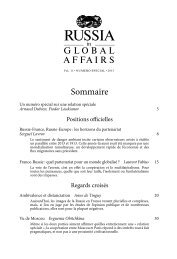said Oleg Dorin of Saint-Gobain. - CCIFR
said Oleg Dorin of Saint-Gobain. - CCIFR
said Oleg Dorin of Saint-Gobain. - CCIFR
- TAGS
- oleg
- dorin
- ccifr
- www.ccifr.ru
Create successful ePaper yourself
Turn your PDF publications into a flip-book with our unique Google optimized e-Paper software.
24<br />
RUSSIA–FRANCE<br />
By Roland Oliphant<br />
Leaky power plants. Poorly insulated<br />
apartments. Central heating systems<br />
that you can’t turn <strong>of</strong>f. Russia is probably<br />
one <strong>of</strong> the most wasteful energy<br />
users in the world.<br />
But for companies that specialize in tackling<br />
such problems, it is an ideal customer.<br />
It is difficult to overstate the scale <strong>of</strong> energy<br />
waste in Russia. A 2008 report by the World Bank<br />
and International Financial Corporation found<br />
that Russia wastes as much energy each year as<br />
France consumes. They cited the International<br />
Energy Agency’s explanation that France used<br />
275.97 million tons <strong>of</strong> oil equivalent in 2005.<br />
Russia used 646.68 million tons.<br />
In terms <strong>of</strong> efficiency, that means Russia used<br />
0.42 tons <strong>of</strong> oil equivalent per dollar <strong>of</strong> gross<br />
domestic product in 2005, while France used just<br />
0.14 tons <strong>of</strong> oil equivalent.<br />
The Russian government isn’t blind to the<br />
problem. In 2008 it set a target <strong>of</strong> reducing the<br />
country’s so-called gross domestic product energy<br />
intensity by 40 percent and obtaining 4.5 percent<br />
<strong>of</strong> the country’s energy from renewable energy<br />
by 2020.<br />
That was followed in 2009 by a law on energy<br />
efficiency introducing mandatory efficiency<br />
guidelines for buildings and laying out financial<br />
and legal incentives to encourage conservation.<br />
At the time, the legislation was little more<br />
than words. The bill was “framework” legislation<br />
that required the passage <strong>of</strong> 38 bylaws to<br />
make it active. It coincided with the promotion<br />
<strong>of</strong> President Dmitry Medvedev’s buzzword,<br />
“innovation.”<br />
Nonetheless, some Western energy companies<br />
took the bill as a sign that the political wind was<br />
changing and hurried to enter the Russian market.<br />
When Inefficiency<br />
Pays Off<br />
The French have been leading the way on a<br />
handful <strong>of</strong> conservation efforts. French companies<br />
such as Lafarge were instrumental in planning<br />
the renovation <strong>of</strong> the World Wildlife Fund’s<br />
headquarters in Moscow. The plans to turn the<br />
building into the capital’s first “eco-house” were<br />
unveiled at a ceremony at the French Embassy in<br />
February.<br />
In March, French Ambassador Jean de Gliniasty<br />
again presided over an energy-efficiency project:<br />
the opening <strong>of</strong> the French-Russian Energy<br />
Efficiency Center.<br />
More <strong>of</strong> a bilateral center for exchanging<br />
ideas on efficiency than a pr<strong>of</strong>it-making exercise,<br />
it is backed by firms such as energy management<br />
RUSSIA’S INFRASTRUCTURE<br />
WASTES ENERGY ON A SCALE THAT<br />
IS PRACTICALLY UNRIVALED. BUT<br />
IT OFFERS ENERGY-EFFICIENCY<br />
FIRMS A BUSINESS OPPORTUNITY<br />
WITH GOVERNMENT BACKING.<br />
“The signals that have been sent are very<br />
important,” <strong>said</strong> Andrei Lavrinenko, vice president<br />
<strong>of</strong> Alstom in Russia. “It’s clear now that<br />
energy efficiency is on the radar, and it has been<br />
factored into the government’s plans for the<br />
future. It is not a passing fad they are going to<br />
forget,” he <strong>said</strong>.<br />
French energy companies have been making<br />
a vigorous assault on the Russian market.<br />
In March, regional electrical grid operator MRSK<br />
Holding gave ERDF Distribution, the grid operating<br />
subsidiary <strong>of</strong> EDF, the right to run the Tomsk<br />
Distribution Company. ERDF’s tasks will include<br />
improving financial performance and upgrading<br />
equipment and safety standards. The final con-<br />
It’s clear now that energy efficiency is on<br />
the country’s radar and part <strong>of</strong> government<br />
plans, <strong>said</strong> Alstom’s Lavrinenko.<br />
specialist Schneider Electric, electricity holding<br />
EDF and power generation and grid company<br />
Alstom.<br />
EFFICIENT ENERGY<br />
Today, 36 <strong>of</strong> the needed 38 bylaws have been<br />
passed, and there has been a recent tie-up between<br />
the International Financial Corporation and the<br />
Russian Energy Agency, the department created<br />
in 2008 to implement the energy efficiency strategy.<br />
Those developments have enhanced lobbyists’<br />
access to government, leading to a general<br />
sensibility that energy efficiency is the right horse<br />
to back.<br />
In December the government approved a state<br />
energy efficiency program through 2020 — a binding<br />
document that envisages investments <strong>of</strong> 9.53<br />
trillion rubles ($335 billion), with 695 billion rubles<br />
in state spending — over the coming decade.<br />
tract is expected to be inked at the St. Petersburg<br />
Economic Forum this month.<br />
In February, Alstrom and RusHydro, the stateowned<br />
monopoly controlling most <strong>of</strong> Russia’s<br />
hydroelectric dams, agreed to set up a joint venture<br />
for producing equipment for small-scale hydro<br />
stations in Bashkortostan. In May the parties <strong>said</strong><br />
RusHydro would be taking control <strong>of</strong> the venture,<br />
with a stake <strong>of</strong> 50 percent plus one share.<br />
Earlier, in October 2010, French construction<br />
material maker <strong>Saint</strong>-<strong>Gobain</strong> and Turkish glass<br />
producer Trakya Cam agreed to invest 184 million<br />
euros ($257 million) into a new factory that will<br />
make window glass for the construction and automotive<br />
industries in Tatarstan.<br />
CHANGING MINDS<br />
But even the pioneers admit it is still very early<br />
days. “In Russia setting up [energy efficiency]<br />
is a young process, and it faces the same difficulties<br />
as any just-started process: a lack <strong>of</strong><br />
methodology, norms and regulating rules,” explained<br />
Jean-Louis Stasi, country president for<br />
Schneider Electric.<br />
Rules are one thing — but mentality is<br />
another. In a country accustomed to having an<br />
abundance <strong>of</strong> oil and gas, convincing people to<br />
consider wise energy use in the first place can be<br />
an uphill battle.<br />
“We can’t do anything unless we get people<br />
to think about energy efficiency as a matter <strong>of</strong><br />
course, to bring that thinking into the mainstream,”<br />
<strong>said</strong> Timur Ivanov, head <strong>of</strong> the Russian<br />
Energy Agency in an interview at the agency’s<br />
Moscow headquarters.<br />
Ivanov added, “Unfortunately, there are lots<br />
<strong>of</strong> people who say, ‘We have lots <strong>of</strong> oil and gas,<br />
why shouldn’t we use it?’ and others who just<br />
assume energy efficiency means losing money.”<br />
Ivanov’s agency has made public awareness<br />
campaigns one <strong>of</strong> its priorities.<br />
Schneider Electric has joined the awareness<br />
effort with gusto. In fact, it <strong>of</strong>fers free online<br />
courses on conservation through an “Energy<br />
University” on its Russian-language web site.<br />
The courses — covering subjects like alternative<br />
power generation technologies, energy efficiency,<br />
energy audits and heating, ventilation and air<br />
conditioning (HVAC in industry jargon) — are<br />
meant to “provide the latest information and pr<strong>of</strong>essional<br />
training on energy efficiency concepts,”<br />
Stasi wrote in an e-mail interview.<br />
There are problems beyond the scope <strong>of</strong> continuing<br />
education, however, and control <strong>of</strong> the<br />
companies themselves.<br />
The government has long promised to ease<br />
strict controls on the rates that utilities companies<br />
charge end consumers — especially for gas,<br />
with its heavy government subsidies.<br />
But Prime Minister Vladimir Putin in February<br />
criticized the government for allowing prices<br />
to grow too fast in the regions, and regulators<br />
SCHNEIDER ELECTRIC




